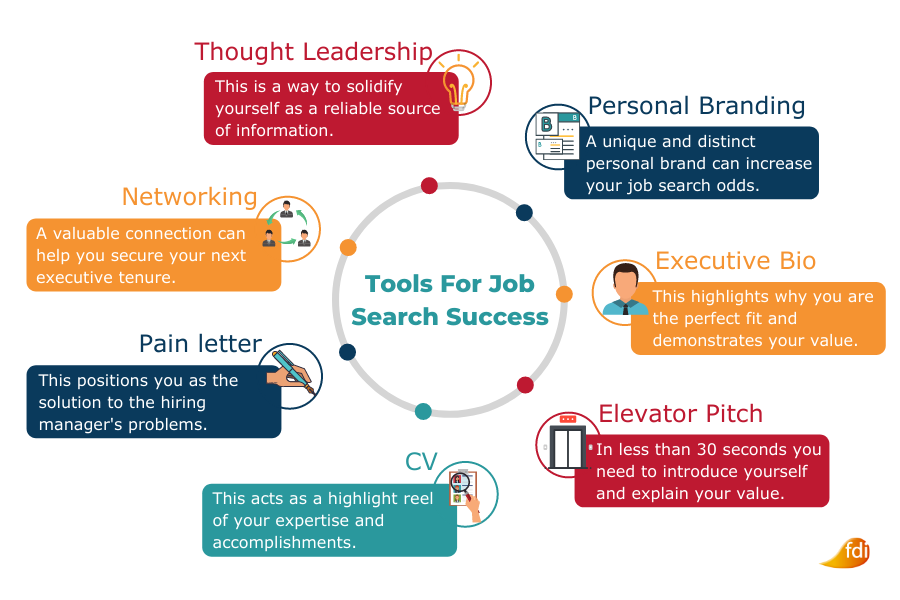In a candidate-driven market, it’s crucial to get your job search just right. As a senior manager or executive working in the life sciences, chances are you’re up against the best of the best. Anything that you can do to differentiate yourself from the competition will work wonders for your career. For this reason, then, being proactive in your job search is key. Make no mistake, you can’t expect to score your dream job by submitting your standardised CV and passively trawling job boards.
We’ve compiled a selection of our most valuable blog posts to help you secure your next executive tenure. From expanding your professional network to crafting killer job search touchpoints and harnessing your personal brand, we’ve got you covered:
1) How Showcasing Your Personal Brand Leads To Job Search Success
Your personal brand showcases who you are and what value you offer. Since your personal brand is unique to you, it can differentiate you from the competition in an interview setting. Your personal brand is woven throughout your job search touchpoints; CV, cover letter, LinkedIn profile and elevator pitch. While it might be a candidate-driven market, competition for top executive-level roles is intense, and so a unique personal brand can increase your job search success odds tenfold. From helping to build your network to advancing your career, this blog post walks you through 5 benefits of harnessing your personal brand.
Click here to learn more: How Showcasing Your Personal Brand Leads To Job Search Success.
2) How To Pen An Executive Bio: 3 Tips For Life Science Executives
Your executive bio should present your expertise, career history, professional accomplishments and values in no longer than 300 words. It highlights why you are a perfect fit and demonstrates what you can bring to the role that other candidates can’t. Your executive bio should be positioned at the top of your CV and LinkedIn profile. If you want to write a powerful and engaging executive bio, then you need to stay on-brand across your job search touchpoints and keep-it-up-to-date with your most recent experiences and achievements.
For more information on the structure of an executive bio, read our blog: How To Pen An Executive Bio: 3 Tips For Life Science Executives.
3) How To Hone An Executive Elevator Pitch You Can Be Proud Of
An elevator pitch is a short speech designed to explain to a new contact who you are and what you do in a time-pressed scenario, like a job interview or networking event, for example. It allows you to introduce yourself, deliver your value proposition and also serves as an answer to the dreaded “tell me about yourself” question which crops up at job interviews. The key to crafting an executive elevator pitch is to be as concise as possible; after all, you only have 30 seconds or less to deliver it.
Make a strong first impression with your elevator pitch by reading our blog: How To Hone An Executive Elevator Pitch You Can Be Proud Of.
RELATED: Increase quality-of-hire by partnering with a reputable boutique executive search firm
4) How To Pen A Killer CV: Tips For Life Science Executives
With only seven seconds to catch the Hiring Manager’s eye, your CV is of paramount importance. This tactical document not only acts as a highlight reel of your expertise, experiences and accomplishments, but it also demonstrates your underlying value. Your executive CV is essentially a sales tool designed to get you noticed by the hiring manager. You need to ensure that for each position you apply for, you have a tailored CV to match.
Read the blog for more tips on writing an impressive CV: How To Pen A Killer CV: Tips For Life Science Executives.
5) How To Hone An Executive Pain Letter Which Secures Interviews
Whereas the cover letter generally amplifies the skills, experience and accomplishments on your CV, the pain letter puts these into context in a compelling narrative. It identifies the hypothetical problem the hiring manager faces, and positions you as the solution. To put it simply, it’s all about them – the hiring manager and his/her function – not you. A well-honed pain letter helps you to stand out from the myriad of applications and cover letters the hiring manager might receive.
For more information on what to include in your executive pain letter, read the blog: How To Hone An Executive Pain Letter Which Secures Interviews.
6) How To Build And Maintain Your Professional Network
In an increasingly connected world, it’s not about what you know, but who you know. A valuable connection can help you secure your next executive tenure. Networking is all about building long-term relationships; it’s one of the most impactful ways to expand your network. It’s about how you can empower others in their career, and how they can help you in return. Essentially, it’s a way to establish your personal brand and build your reputation within the life sciences industry.
For more benefits of building a robust network, click here to read the blog: How To Build And Maintain Your Professional Network.
7) 7 Secrets Of Successful Thought Leadership For Life Science Executives
A thought leader is someone whose thoughts, opinions and messages are seen as credible, authoritative and influential. Their perspective on their industry or area of expertise inspires and influences others. It’s essentially a way for you to solidify yourself as a reliable and credible source of information. Thought leadership opens up doorways and hands you job opportunities on a silver platter, making it an excellent way to future-proof your career.
Take your thought leadership to the next level by reading our blog: 7 Secrets Of Successful Thought Leadership For Life Science Executives.
* Fraser Dove International is a talent consultancy operating across the life sciences industry. While our roots lie in executive search, we provide more than the traditional recruitment services. Uniquely placed within the market, we have been providing cutting-edge talent solutions and insight to organisations at all stages of their journey – from start-up to established leaders – since 2013.

 Estimated read time: 4 mins
Estimated read time: 4 mins Date posted:03/08/2020
Date posted:03/08/2020





